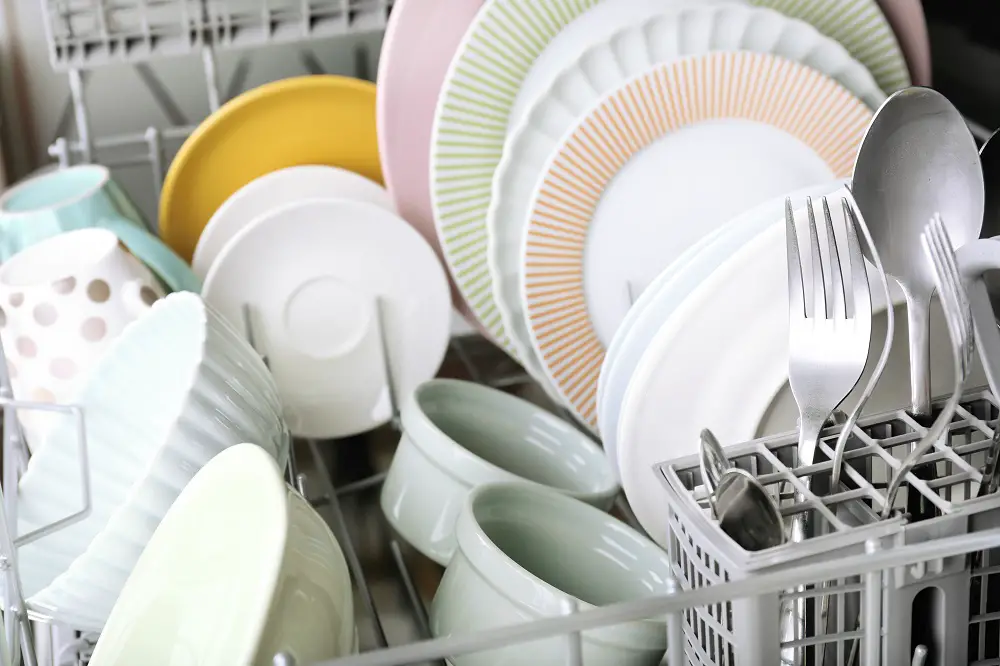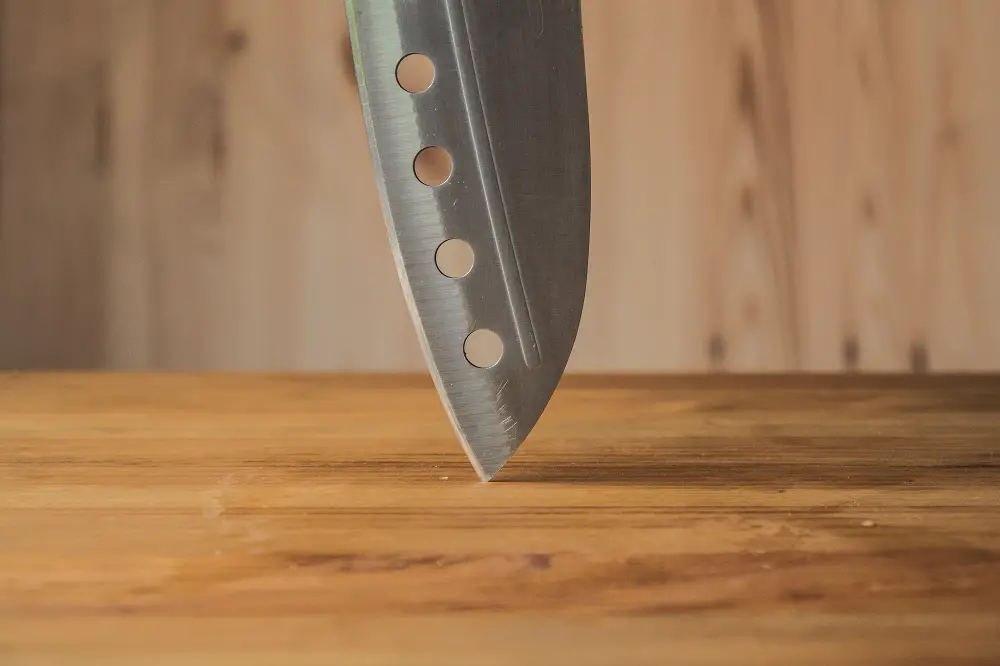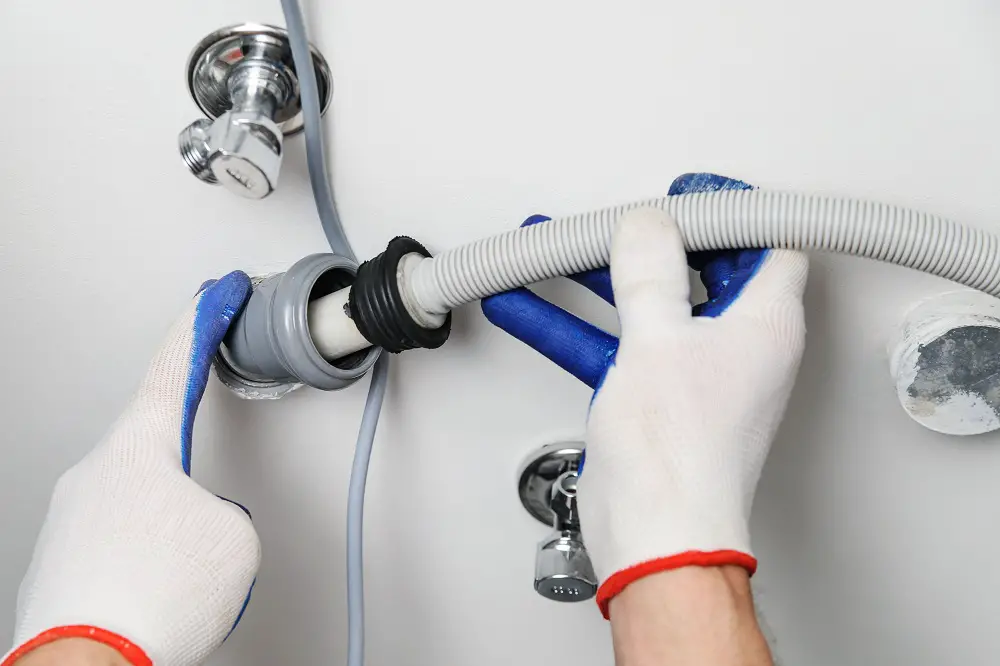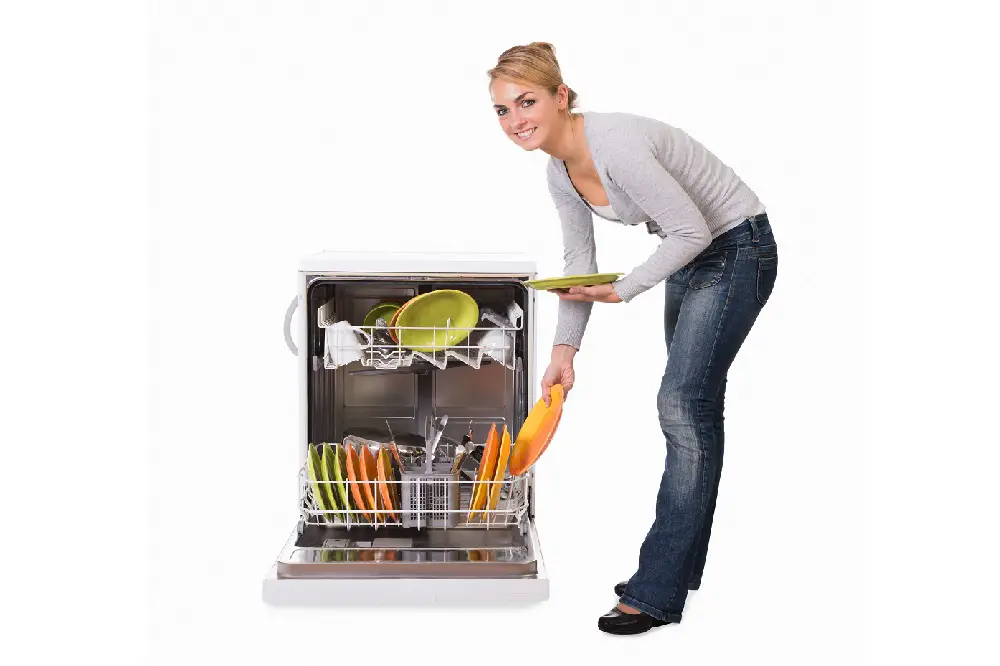Portable dishwashers, both countertops and freestanding types are beneficial in terms of space-saving, portability, and convenience. While they make the household chore of dishwashing easier, there’s the question, ‘How long do portable dishwashers last?’
Portable dishwashers typically last about 7-10 years. However, several factors like the brand, tub design, usage frequency, environment, loading, water quality, and maintenance impact the lifespan.
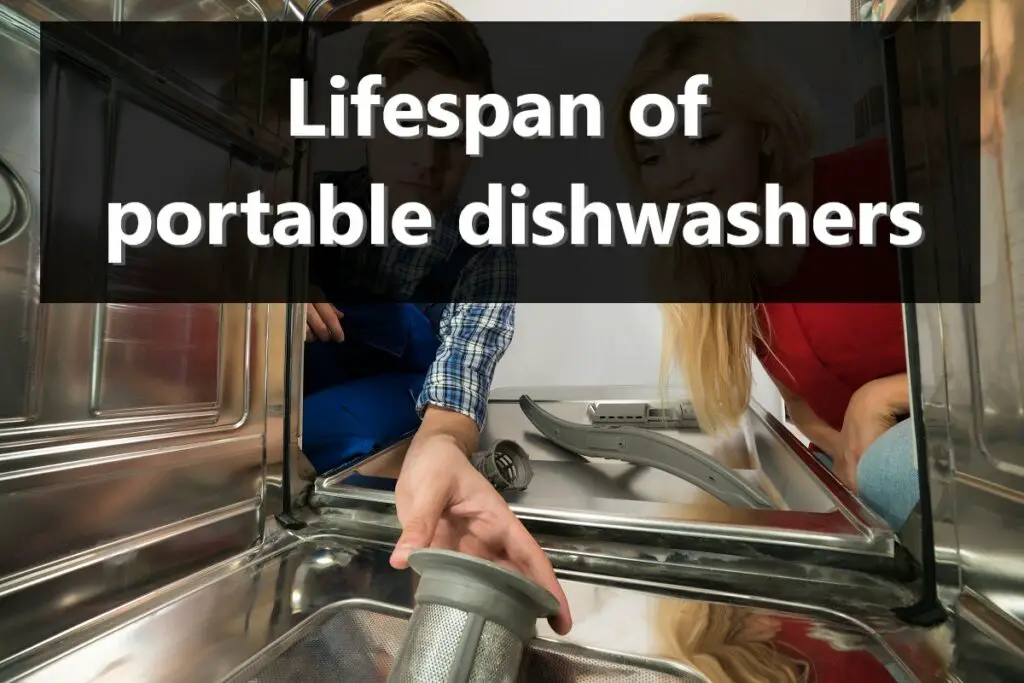
There are a few steps to ensure maximum efficiency and longevity from your portable dishwasher. Read on to know more.
Table of Contents
Lifespan of Portable Dishwashers
Portable dishwashers have a 7-10 years lifespan. In most cases, about 30% of dishwashers require repair in the first five years. Any portable dishwasher that’s more than a decade old is best replaced instead of repaired.
However, this is just an estimate since several factors determine durability. Proper care and maintenance make it possible to get your dishwasher last longer.
Unsurprisingly, appliances have a shorter lifespan than they used to a few years back. This is primarily due to economic factors affecting all durable goods, using more plastic than metal to make machines and production of individual components, often outsourced to the least-expensive third-party manufacturers.
Here’s a quick comparison of the durability of portable dishwashers with other commonly used household appliances.
| Appliance | Average Lifespan |
|---|---|
| Portable dishwashers | 7-10 years |
| Regular dishwashers | 9-16 years |
| Tumble dryers | 10-15 years |
| Dryers | 8-13 years |
| Portable washers | 7-10 years |
| Regular washers | 10-15 years |
7 Factors That Determine the Durability
Several factors determine the durability of portable dishwashers.
1. Brand
Some manufacturers boast a longer lifespan for their portable dishwashers. Brands like Bosch, Beko, Samsung, Whirlpool, LG, Maytag, and Frigidaire have portable dishwashers lasting an average of 10 years.
On the other hand, Miele dishwashers are built to last 20 years with regular use. While they might cost more relative to similar machines from other brands, they’re a great value in the long term.
2. Interior Tub Design
Generally, the dishwasher tub interiors are made of either plastic or stainless steel.
While the stainless steel tub dishwashers will cost more, they help boost the drying performance by helping pull moisture off the dishes and onto the tub’s surface. Stainless steel increases durability and easy maintenance and is less likely to stain.
On the other hand, dishwashers with plastic tubs will cost less but aren’t as long-lasting as those with stainless steel tubs. Also, you’ll need to clean the plastic tub interior regularly.
3. Frequency of Use
The average home runs the dishwasher five times a week. The lesser the frequency of use, the less likely the appliance will require repairs and the longer it will last.
However, it’s also important not to let your portable dishwasher stay unused for extended periods (as with most other electrical appliances). It’s good practice to run the dishwasher at least once a week.
4. Environment
If your home has high ambient humidity, the dishwasher must work harder to dry your dishes, impacting its durability.
Also, the increased moisture content in the air can affect the internal components that aren’t designed to handle moisture, leading to rust and corrosion.
Summer heat can create excessive limescale buildup on the dishwasher’s inside owing to the water supply since the water pipes get heated up. Limescale buildup eventually degrades the dishwasher’s durability.
And a drop in temperature around wintertime could lead to condensation problems, resulting in mold or mildew. This will also impact the durability.
5. Loading
Loading dishes without scraping off excess food debris or packaging scraps can damage the dishes and lead to a product malfunction.
How you load the dishwasher is also an essential factor. It’s important to load the machine so the spray nozzle can move freely and doesn’t collide with any dishes or handles sticking out. Avoid overloading; else, it could cause damage to the dishwasher and dishes.
Alternatively, the appliance won’t be able to clean the dishes properly, causing you to rerun the machine to rewash the dishes that remain dirty, impacting the machine’s lifespan.
Finally, there are some items you must avoid washing in the dishwasher as they could damage the appliance. Items like delicate glassware, cans with paper labels, plastic jars, and candle jars are best kept out of the dishwasher.
Get more useful tips on the usage of portable dishwashers in our comprehensive guide.
6. Water Quality
If you live in an area with hard water, you’ll notice mineral films and discoloration inside your dishwasher. These deposits appear like a cloudy film on your machine’s interior and your dishes. The rack rails and wheels will also move with resistance.
Over time, this will cause deteriorated functioning of the dishwasher, reducing its lifespan.
7. Maintenance
Regular maintenance is vital to make any electrical appliance, including portable dishwashers, last longer. Neglecting your machine’s maintenance will lead to issues and reduced durability.
How To Prolong the Lifespan?
Here are a few tips to help your portable dishwasher last longer and work efficiently:
Use Good Water
A good clean water supply to your dishwasher is essential for effective dishwashing and keeping your appliance running in good condition for a long time.
If you have hard water, either use a water softener or a regeneration salt in the dishwasher’s water-softening system.
It prevents clouding, spotting, and mineral buildup, hence improving cleaning and helping prolong its life.
Use a Quality Cleaner
Choose a high-quality detergent for your portable dishwasher. Refer to the instruction manual to check for the recommended detergent to use with the dishwasher model you have.
Additionally, for hard-water films inside your dishwasher, use a citric-acid-based dishwasher cleanser (like Finish or Affresh) monthly. You can follow the package directions for proper use.
Helpful tip: Skip the regular detergent pods for countertop dishwashers since they use less detergent than a full-sized or stand-alone dishwasher. Instead, use liquid or powder detergent.
Avoid Overloading
While loading your dishwasher, leave adequate space between dishes. Cramming too much into one load will put unnecessary strain on the dishwasher. It’ll restrict the water spray patterns and prevent proper cleaning.
Place any pots and cups facing down, so water can spray into them, and arrange the dishes with the dirtiest surface facing towards the machine’s center.
It’s recommended to run your dishwasher with fuller loads (without overloading) to reduce the number of cycles and lead to a longer overall lifespan.
Scrape the Dishes
Before loading the dishwasher, it’s essential to scrape any large food chunks (hard items like bones, toothpicks, and greasy foods) off the dishes.
Hard bits can tear the filter, clog the drain hose, or damage the pump.
Clean the Dishwasher Filter
The remaining food stuck on the dishes goes into the dishwasher’s filter. Cleaning the filter once a month is good practice.
Especially if you notice reduced wash performance or dishes aren’t coming out clean and feel gritty, clean it immediately.
Remove the filter and run it (and the filter door) under clean water till it’s free of debris. Use a toothbrush or soft sponge with warm soapy water to remove stubbornly stuck food particles. Once done, reinstall the filter back to its position.
If you notice any holes in the filter, replace it immediately to prevent hard debris from slipping into the pump. This can damage the motor seals and pump impeller.
Use Hot Water
Your dishwasher uses hot water to kill the bacteria, odor, and germs on your dishes. The detergent is also more effective at higher temperatures.
When the water delivered to the appliance is cold, it runs longer to reach the optimal temperature and maintain it. If you can provide the dishwasher with a hot water supply (about 120 F), it’ll help in faster operation.
Regular Maintenance
Dishwashers can get grimy and have residue buildup, reducing their cleaning power and efficiency.
With regular maintenance, dishwashers will last longer and run efficiently. Here are some routine maintenance tips:
- Clean the food trap and filter at least once a month.
- Wipe the door seals and food spills routinely with warm water, mild soap, and a soft cloth.
- Try unclogging the appliance by yourself before calling in a technician, if you notice even an inch of standing water at the bottom of the appliance.
- Fix the plastic coating of the racks when they wear off with replacement tine tips or vinyl paint (to avoid rust and rusty metal shards entering the pump).
- Check the spray nozzles in the wash arms every few months to ensure they’re clean and unobstructed. Use a toothpick or pipe cleaner to remove food debris clogging any nozzle.
- Check and clean the drain regularly to avoid clogging and malfunctions
- For any repairs, get a trained and experienced technician to fix the dishwasher.
Also, check our full guide on how to clean a portable dishwasher drain.
Opt for Air-Dry
When you’re not in a rush, air-dry your dishes and avoid using the dishwasher’s heat cycle (it uses more energy and strains the appliance).
This is an energy-efficient way to dry dishes, and it’s also safer on your dishes than condensation drying.
Some dishwashers automatically open the door once the wash cycle is complete for air drying.
Conclusion
Portable dishwashers last for about 7-10 years. However, with the proper use and maintenance, it’s possible to make them last longer and in good working condition.
You can keep your dishwasher in good shape beyond the 10-year mark by following some good practices. Use good water and a quality cleaner, regularly clean the dishwasher filter, perform regular maintenance, scrape the dishes before loading, avoid overloading the machine, use a hot water supply, and opt for air-dry.
